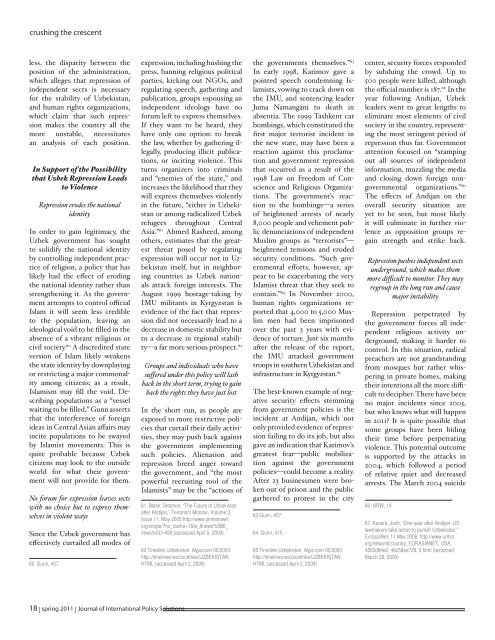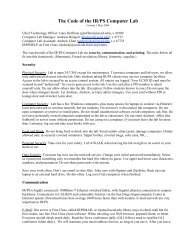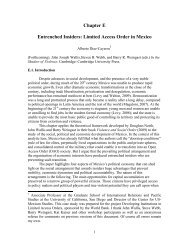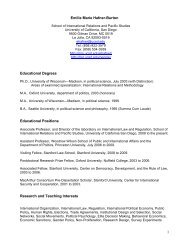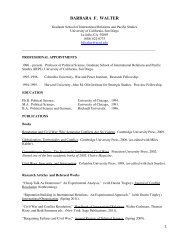to download the full journal. (1.2MB PDF) - School of International ...
to download the full journal. (1.2MB PDF) - School of International ...
to download the full journal. (1.2MB PDF) - School of International ...
Create successful ePaper yourself
Turn your PDF publications into a flip-book with our unique Google optimized e-Paper software.
crushing <strong>the</strong> crescent<br />
less, <strong>the</strong> disparity between <strong>the</strong><br />
position <strong>of</strong> <strong>the</strong> administration,<br />
which alleges that repression <strong>of</strong><br />
independent sects is necessary<br />
for <strong>the</strong> stability <strong>of</strong> Uzbekistan,<br />
and human rights organizations,<br />
which claim that such repression<br />
makes <strong>the</strong> country all <strong>the</strong><br />
more unstable, necessitates<br />
an analysis <strong>of</strong> each position.<br />
In Support <strong>of</strong> <strong>the</strong> Possibility<br />
that Uzbek Repression Leads<br />
<strong>to</strong> Violence<br />
Repression erodes <strong>the</strong> national<br />
identity<br />
In order <strong>to</strong> gain legitimacy, <strong>the</strong><br />
Uzbek government has sought<br />
<strong>to</strong> solidify <strong>the</strong> national identity<br />
by controlling independent practice<br />
<strong>of</strong> religion, a policy that has<br />
likely had <strong>the</strong> effect <strong>of</strong> eroding<br />
<strong>the</strong> national identity ra<strong>the</strong>r than<br />
streng<strong>the</strong>ning it. As <strong>the</strong> government<br />
attempts <strong>to</strong> control <strong>of</strong>ficial<br />
Islam it will seem less credible<br />
<strong>to</strong> <strong>the</strong> population, leaving an<br />
ideological void <strong>to</strong> be filled in <strong>the</strong><br />
absence <strong>of</strong> a vibrant religious or<br />
civil society. 60 A discredited state<br />
version <strong>of</strong> Islam likely weakens<br />
<strong>the</strong> state identity by downplaying<br />
or restricting a major commonality<br />
among citizens; as a result,<br />
Islamism may fill <strong>the</strong> void. Describing<br />
populations as a “vessel<br />
waiting <strong>to</strong> be filled,” Gunn asserts<br />
that <strong>the</strong> interference <strong>of</strong> foreign<br />
ideas in Central Asian affairs may<br />
incite populations <strong>to</strong> be swayed<br />
by Islamist movements. This is<br />
quite probable because Uzbek<br />
citizens may look <strong>to</strong> <strong>the</strong> outside<br />
world for what <strong>the</strong>ir government<br />
will not provide for <strong>the</strong>m.<br />
No forum for expression leaves sects<br />
with no choice but <strong>to</strong> express <strong>the</strong>mselves<br />
in violent ways<br />
Since <strong>the</strong> Uzbek government has<br />
effectively curtailed all modes <strong>of</strong><br />
60 Gunn, 407<br />
expression, including hushing <strong>the</strong><br />
press, banning religious political<br />
parties, kicking out NGOs, and<br />
regulating speech, ga<strong>the</strong>ring and<br />
publication, groups espousing an<br />
independent ideology have no<br />
forum left <strong>to</strong> express <strong>the</strong>mselves.<br />
If <strong>the</strong>y want <strong>to</strong> be heard, <strong>the</strong>y<br />
have only one option: <strong>to</strong> break<br />
<strong>the</strong> law, whe<strong>the</strong>r by ga<strong>the</strong>ring illegally,<br />
producing illicit publications,<br />
or inciting violence. This<br />
turns organizers in<strong>to</strong> criminals<br />
and “enemies <strong>of</strong> <strong>the</strong> state,” and<br />
increases <strong>the</strong> likelihood that <strong>the</strong>y<br />
will express <strong>the</strong>mselves violently<br />
in <strong>the</strong> future, “ei<strong>the</strong>r in Uzbekistan<br />
or among radicalized Uzbek<br />
refugees throughout Central<br />
Asia.” 61 Ahmed Rasheed, among<br />
o<strong>the</strong>rs, estimates that <strong>the</strong> greatest<br />
threat posed by regulating<br />
expression will occur not in Uzbekistan<br />
itself, but in neighboring<br />
countries as Uzbek nationals<br />
attack foreign interests. The<br />
August 1999 hostage-taking by<br />
IMU militants in Kyrgyzstan is<br />
evidence <strong>of</strong> <strong>the</strong> fact that repression<br />
did not necessarily lead <strong>to</strong> a<br />
decrease in domestic stability but<br />
<strong>to</strong> a decrease in regional stability—a<br />
far more serious prospect. 62<br />
Groups and individuals who have<br />
suffered under this policy will lash<br />
back in <strong>the</strong> short term, trying <strong>to</strong> gain<br />
back <strong>the</strong> rights <strong>the</strong>y have just lost<br />
In <strong>the</strong> short run, as people are<br />
exposed <strong>to</strong> more restrictive policies<br />
that curtail <strong>the</strong>ir daily activities,<br />
<strong>the</strong>y may push back against<br />
<strong>the</strong> government implementing<br />
such policies. Alienation and<br />
repression breed anger <strong>to</strong>ward<br />
<strong>the</strong> government, and “<strong>the</strong> most<br />
powerful recruiting <strong>to</strong>ol <strong>of</strong> <strong>the</strong><br />
Islamists” may be <strong>the</strong> “actions <strong>of</strong><br />
61 Blank, Stephen, “The Future <strong>of</strong> Uzbekistan<br />
after Andijan,” Terrorism Moni<strong>to</strong>r, Volume 3,<br />
Issue 11. May 2005 http://www.james<strong>to</strong>wn.<br />
org/single/?no_cache=1&tx_ttnews%5Btt_<br />
news%5D=495 (accessed April 5, 2009)<br />
62 Timeline Uzbekistan. Algis.com 05/2003<br />
http://timelines.ws/countries/UZBEKISTAN.<br />
HTML (accessed April 2, 2009)<br />
<strong>the</strong> governments <strong>the</strong>mselves.” 63<br />
In early 1998, Karimov gave a<br />
pointed speech condemning Islamists,<br />
vowing <strong>to</strong> crack down on<br />
<strong>the</strong> IMU, and sentencing leader<br />
Juma Namangani <strong>to</strong> death in<br />
absentia. The 1999 Tashkent car<br />
bombings, which constituted <strong>the</strong><br />
first major terrorist incident in<br />
<strong>the</strong> new state, may have been a<br />
reaction against this proclamation<br />
and government repression<br />
that occurred as a result <strong>of</strong> <strong>the</strong><br />
1998 Law on Freedom <strong>of</strong> Conscience<br />
and Religious Organizations.<br />
The government’s reaction<br />
<strong>to</strong> <strong>the</strong> bombings—a series<br />
<strong>of</strong> heightened arrests <strong>of</strong> nearly<br />
8,000 people and vehement public<br />
denunciations <strong>of</strong> independent<br />
Muslim groups as “terrorists”—<br />
heightened tensions and eroded<br />
security conditions. “Such governmental<br />
efforts, however, appear<br />
<strong>to</strong> be exacerbating <strong>the</strong> very<br />
Islamist threat that <strong>the</strong>y seek <strong>to</strong><br />
contain.” 64 In November 2000,<br />
human rights organizations reported<br />
that 4,000 <strong>to</strong> 5,000 Muslim<br />
men had been imprisoned<br />
over <strong>the</strong> past 3 years with evidence<br />
<strong>of</strong> <strong>to</strong>rture. Just six months<br />
after <strong>the</strong> release <strong>of</strong> <strong>the</strong> report,<br />
<strong>the</strong> IMU attacked government<br />
troops in sou<strong>the</strong>rn Uzbekistan and<br />
infrastructure in Kyrgyzstan. 65<br />
The best-known example <strong>of</strong> negative<br />
security effects stemming<br />
from government policies is <strong>the</strong><br />
incident at Andijan, which not<br />
only provided evidence <strong>of</strong> repression<br />
failing <strong>to</strong> do its job, but also<br />
gave an indication that Karimov’s<br />
greatest fear—public mobilization<br />
against <strong>the</strong> government<br />
policies—could become a reality.<br />
After 23 businessmen were broken<br />
out <strong>of</strong> prison and <strong>the</strong> public<br />
ga<strong>the</strong>red <strong>to</strong> protest in <strong>the</strong> city<br />
63 Gunn, 407<br />
64 Gunn, 415<br />
65 Timeline Uzbekistan. Algis.com 05/2003<br />
http://timelines.ws/countries/UZBEKISTAN.<br />
HTML (accessed April 2, 2009)<br />
center, security forces responded<br />
by subduing <strong>the</strong> crowd. Up <strong>to</strong><br />
500 people were killed, although<br />
<strong>the</strong> <strong>of</strong>ficial number is 187. 66 In <strong>the</strong><br />
year following Andijan, Uzbek<br />
leaders went <strong>to</strong> great lengths <strong>to</strong><br />
eliminate most elements <strong>of</strong> civil<br />
society in <strong>the</strong> country, representing<br />
<strong>the</strong> most stringent period <strong>of</strong><br />
repression thus far. Government<br />
attention focused on “stamping<br />
out all sources <strong>of</strong> independent<br />
information, muzzling <strong>the</strong> media<br />
and closing down foreign nongovernmental<br />
organizations.” 67<br />
The effects <strong>of</strong> Andijan on <strong>the</strong><br />
overall security situation are<br />
yet <strong>to</strong> be seen, but most likely<br />
it will culminate in fur<strong>the</strong>r violence<br />
as opposition groups regain<br />
strength and strike back.<br />
Repression pushes independent sects<br />
underground, which makes <strong>the</strong>m<br />
more difficult <strong>to</strong> moni<strong>to</strong>r. They may<br />
regroup in <strong>the</strong> long run and cause<br />
major instability<br />
Repression perpetrated by<br />
<strong>the</strong> government forces all independent<br />
religious activity underground,<br />
making it harder <strong>to</strong><br />
control. In this situation, radical<br />
preachers are not grandstanding<br />
from mosques but ra<strong>the</strong>r whispering<br />
in private homes, making<br />
<strong>the</strong>ir intentions all <strong>the</strong> more difficult<br />
<strong>to</strong> decipher. There have been<br />
no major incidents since 2005,<br />
but who knows what will happen<br />
in 2011? It is quite possible that<br />
some groups have been biding<br />
<strong>the</strong>ir time before perpetrating<br />
violence. This potential outcome<br />
is supported by <strong>the</strong> attacks in<br />
2004, which followed a period<br />
<strong>of</strong> relative quiet and decreased<br />
arrests. The March 2004 suicide<br />
66 HRW, 19<br />
67 Kucera, Josh. “One year after Andijan: US<br />
lawmakers take action <strong>to</strong> punish Uzbekistan.”<br />
EurasiaNet, 11 May 2006. http://www.unhcr.<br />
org/refworld/country, EURASIANET, USA,<br />
4562d94e2, 46c58ee728, 0.html (accessed<br />
March 28, 2009)<br />
18 | spring 2011 | Journal <strong>of</strong> <strong>International</strong> Policy Solutions


